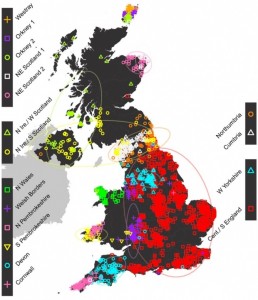Population genetic history mapped
Most stories about population genetic ancestry tend to be based on pure male-line or pure female-line ancestry, which can be unrepresentative. That’s especially true when you’re looking at invasions — invaders probably leave more Y-chromosomes behind than the rest of the genome. There’s a new UK study that used data on the whole genome from a few thousand British people, chosen because all four of their grandparents lived close together. The idea is that this will measure population structure at the start of the twentieth century, before people started moving around so much.
Here’s the map of ancestry clusters. As the story in the Guardian explains, one thing it shows that the Romans and Normans weren’t big contributors to population ancestry, despite their impact on culture.
Thomas Lumley (@tslumley) is Professor of Biostatistics at the University of Auckland. His research interests include semiparametric models, survey sampling, statistical computing, foundations of statistics, and whatever methodological problems his medical collaborators come up with. He also blogs at Biased and Inefficient See all posts by Thomas Lumley »

I guess I’d be interested in how many people they didn’t use because there grandparents didn’t live close enough together. And whether they thought it biased the map.
My English ancestors were way more diverse than that map – some were born in Ireland, some Scotland, some had French surnames, some were too dark to be native English, another line was gypsy – and they were not known for hanging around.
Staying in place takes economic security because you have to wealth to weather the bad times – the poor, like my ancestors moved on.
10 years ago
The findings about Roman and Norman ancestry would be even stronger if there was persistent economic bias after this time — descendants of the ruling invaders would be less likely to be poor.
However, I think it’s more complicated than economic security. The participants will be biased towards descendants of farmers, with both the very poor and the urban middle class missing. In a sense, I’m in the latter group — my grandfathers were both school teachers (one, Catholic primary school; one, rural grammar school) and my parents met at Cambridge.
10 years ago